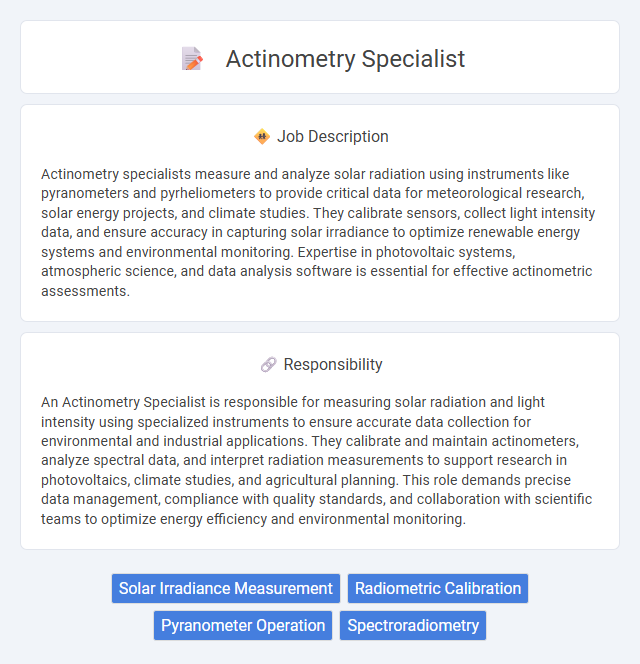
Actinometry specialists measure and analyze solar radiation using instruments like pyranometers and pyrheliometers to provide critical data for meteorological research, solar energy projects, and climate studies. They calibrate sensors, collect light intensity data, and ensure accuracy in capturing solar irradiance to optimize renewable energy systems and environmental monitoring. Expertise in photovoltaic systems, atmospheric science, and data analysis software is essential for effective actinometric assessments.
Individuals with a passion for precise measurement and strong analytical skills are likely well-suited for an Actinometry Specialist role, as the job probably demands meticulous attention to detail and familiarity with photometric instruments. Those comfortable working in controlled laboratory environments and interpreting complex data might find this position aligns with their strengths. Conversely, candidates who prefer dynamic, people-focused roles or struggle with repetitive technical tasks may find the job less suitable.
Qualification
An Actinometry Specialist requires a strong background in physics, chemistry, or environmental science, typically holding a bachelor's or master's degree in these fields. Expertise in measuring solar radiation, analyzing spectral data, and using actinometric instruments is essential for accurate solar energy assessment and environmental monitoring. Proficiency in data analysis software, attention to detail, and experience in field measurements or laboratory settings enhance qualification for this role.
Responsibility
An Actinometry Specialist is responsible for measuring solar radiation and light intensity using specialized instruments to ensure accurate data collection for environmental and industrial applications. They calibrate and maintain actinometers, analyze spectral data, and interpret radiation measurements to support research in photovoltaics, climate studies, and agricultural planning. This role demands precise data management, compliance with quality standards, and collaboration with scientific teams to optimize energy efficiency and environmental monitoring.
Benefit
Actinometry specialists likely provide crucial benefits by accurately measuring light intensity and radiation, which can enhance the efficiency of processes in industries such as solar energy, agriculture, and chemical manufacturing. Their expertise probably helps optimize experimental conditions and improve product quality, reducing costs associated with errors and inefficiencies. Companies employing actinometry specialists may experience increased precision in light-based measurements, leading to better decision-making and technological advancements.
Challenge
Actinometry Specialists likely face the challenge of accurately measuring solar radiation and photon flux to ensure precise data for environmental and industrial applications. The complexity of calibrating sensitive instruments under varying atmospheric conditions may require advanced technical expertise and problem-solving skills. Overcoming these challenges could enhance the reliability of research in fields such as renewable energy and climate science.
Career Advancement
An Actinometry Specialist possesses expertise in measuring solar radiation to support renewable energy projects and environmental studies, making their skills vital for advancing solar technology innovations. Career advancement often involves progressing to senior roles such as Lead Scientist or Renewable Energy Consultant, where strategic project management and data analysis expertise are crucial. Mastery in advanced actinometric equipment, data interpretation, and compliance with international standards significantly enhances promotion prospects in research institutions and energy corporations.
Key Terms
Solar Irradiance Measurement
Actinometry specialists focus on precise measurement of solar irradiance to analyze the intensity and distribution of solar radiation. They employ advanced instruments like pyranometers and spectroradiometers to collect accurate data critical for solar energy system design and climate research. Expertise in calibration, data interpretation, and environmental impact assessment ensures the optimization of solar energy applications and reliable monitoring of atmospheric conditions.
Radiometric Calibration
An Actinometry Specialist focuses on the precise measurement and calibration of solar radiation instruments through advanced radiometric calibration techniques. Expertise in calibrating pyranometers, pyrheliometers, and reference sensors ensures accurate data critical for renewable energy projects, climate research, and atmospheric studies. Proficiency in ISO standards and laboratory procedures enhances instrument reliability and data integrity across various scientific and industrial applications.
Pyranometer Operation
Actinometry specialists with expertise in pyranometer operation play a critical role in measuring solar radiation to optimize energy systems and environmental monitoring. Accurate calibration and maintenance of pyranometers ensure precise data collection for solar radiation assessment, influencing photovoltaic performance and climate research. Proficiency in interpreting high-resolution solar irradiance data supports effective analysis and decision-making in renewable energy projects.
Spectroradiometry
Actinometry Specialists in spectroradiometry measure solar radiation and light intensity with high precision using spectroradiometers to analyze spectral distribution. These experts calibrate instruments to ensure accurate quantification of irradiance across ultraviolet, visible, and infrared wavelengths, critical for climate research and photovoltaic applications. Proficiency in data processing software and knowledge of radiometric standards enhance the reliability of measurements and study outcomes.
 kuljobs.com
kuljobs.com